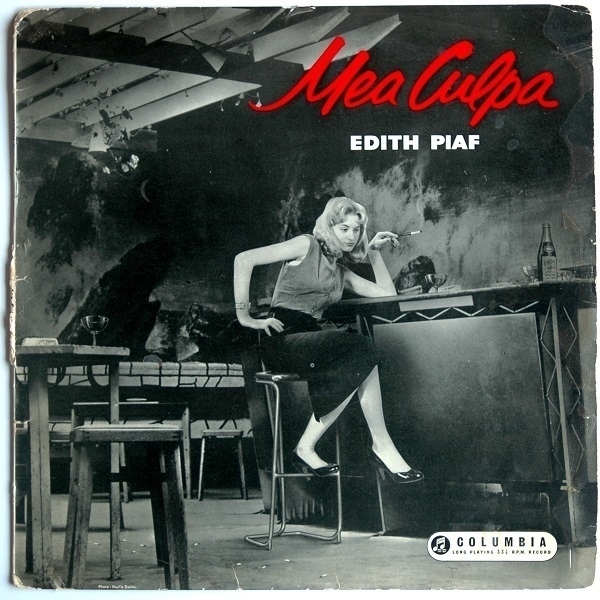Mea Culpa

I love the record cover shown above. A disconsolate young woman smokes a cigarette while nursing a drink at an otherwise deserted bar. It caught my eye during a quick trip to Chepstow just this morning, and I bought it despite having only a few weeks ago picked up another Edith Piaf compilation (Portrait of Piaf: 25 of her Greatest Hits) which already amply covered my modest Piaf needs. Portrait of Piaf is a 1973 double album “electronically reprocessed to give a stereo effect” while Mea Culpa (1958) is in the original mono, with added pops and crackles due to a fair amount of wear & tear it has sustained over the years.
Eight of the earlier album’s fourteen tracks also appear on the later one, with my favourite – ‘La Vie en Rose’ – among them. Mea Culpa is necessarily missing such famous numbers as ‘Milord’ and ‘Non, Je Ne Regrette Rien’ that post-dated it. I was slightly surprised, when first listening to Portrait of Piaf, to recognise a familiar melody in ‘Le Trois Cloches’, which I’d long known from one of its English versions.
On handing over the £3 asking price for Portrait of Piaf at a Monmouth charity shop, the cashier told me she had seen Piaf perform in concert in Paris. I was suitably impressed – only later pausing to wonder at the practicalities of it when I realized Piaf had died as long ago as 1963. Even if it had been one of the singer’s last shows, the cashier (who I don’t think can have been older than in her mid seventies) must have been a teenager at the time. She said she’d had no prior knowledge of Piaf and had been taken along by a friend. On seeing a little old lady come out on to the stage she’d been disconcerted, but her reservations were soon dispelled when Piaf began to sing. “A little old lady” seems an unkind description, given the singer never made it past her forties, but I suppose it’s consistent with how a teenager might have perceived her.